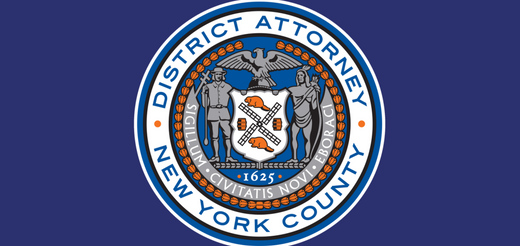D.A. Vance Announces $8M Investment to Create “Center for Trauma Innovation” in Northern Manhattan

Manhattan District Attorney Cyrus R. Vance, Jr., today announced a new funding opportunity to create a Center for Trauma Innovation (CTI) in Northern Manhattan. With an $8 million investment from the D.A.’s Office, the CTI will address the needs of people exposed to trauma by enhancing and expanding trauma-informed and trauma-specific services and resources. The CTI will focus on communities of color that experience disproportionate rates of violence and have less access to trauma services. The CTI will offer culturally-competent, free, clinical and non-clinical trauma-specific services; provide training and technical assistance to local organizations and city agencies seeking to incorporate or enhance trauma-informed and trauma-specific practices; and establish a Trauma Innovation Learning Community that uplifts the CTI’s vision for safety, healing, and equity. The Manhattan D.A.’s Office is providing these grants through its Criminal Justice Investment Initiative (“CJII”), which D.A. Vance created using millions seized in investigations against major banks.
“New York City is a global leader in trauma sciences and services, but there is a massive gap when it comes to serving marginalized New Yorkers who are survivors of crime,” said District Attorney Vance. “Our new Center for Trauma Innovation will close the gap by offering tailored, culturally-appropriate services with a focus on individuals who do not traditionally seek out services – and by training New York-based organizations who are looking to become trauma-informed. We’re excited to use funds forfeited in our investigations against major banks to help more New Yorkers heal.”
Research suggests that more than 70% of adults in the United States experience some sort of traumatic event in their lifetime. One common form of trauma is exposure to violence in the home or community. Exposure to violence – either direct or indirect – can be physically and emotionally damaging, and can even cause long-term health problems. Untreated trauma related to violent events can also have direct and indirect implications for public safety, such as underreporting, victimization, and the perpetuation of violence. Research points to a link between surviving or witnessing abuse and subsequent arrest and incarceration, suggesting that untreated trauma can lead to involvement in the criminal justice system and the perpetuation of violence.
The D.A.’s Office is seeking proposals to create a multi-faceted program designed to collaborate deeply with communities that have been harmed to develop a continuum of innovative, holistic therapeutic services rooted in cultural practices, in addition to evidence-based clinical approaches. The CTI will build relationships with the community through as many access points as possible and pursue creative means to engage people in healing work.
The Center for Trauma Innovation will use a three-pronged approach:
- Direct Service: The CTI will provide trauma-specific services for people exposed to primary and secondary trauma through a range of clinical and non-clinical approaches, including existing, evidence-based interventions and new, innovative methods. The CTI will place special emphasis on adapting clinical services to meet the needs of the client and building relationships to engage people in healing work. Direct service will also include non-clinical therapeutic services carried out by community-based healing staff, which may include peer-support programs, crisis management, case management, psychoeducation, or healing events.
- Training and Technical Assistance: The CTI will provide training support to city agencies and community-based organizations to enhance the range and quality of trauma-informed and trauma-specific practice in New York City. This community education component of the CTI seeks to transfer information, skills, and resources to directly affected people to empower individuals and communities to improve their own health and well-being. Additionally, the CTI will provide support and micro-grants to healers and grassroots organizations already doing this work in Northern Manhattan. Community-based healing staff will have access to mini-grants ranging from $1,000 – $5,000 in support of their work. Additionally, the grant recipient will have the opportunity to select three small grassroots community organizations to receive micro-grants of $20,000 a year for 3 years.
- Trauma Innovation Learning Community: The CTI is designed to draw on knowledge from experts in the trauma field and to disseminate information from its Direct Service and TTA work. The Learning Community will bring together researchers, innovators, practitioners, policymakers, and other experts across sectors dedicated to advancing best practices for intervention and engagement strategies for underrepresented trauma survivors; it will disseminate this information throughout NYC and beyond. In service of its learning community, the CTI may host roundtables, conferences, or community events.
CJII Research and Consultation Process
The CJII plan and investments are the result of an extensive process incorporating research, data analysis, and outreach to community leaders and stakeholders conducted by CUNY ISLG. As the technical assistance provider, ISLG analyzed research in areas affecting public safety in New York City, including systemic factors at the neighborhood level that have an impact on crime, and data from a number of agencies involved in the criminal justice system. In addition, ISLG conducted extensive interviews with more than 250 experts in the criminal justice community and related fields, including clinical practitioners; leaders from philanthropic, non-profit, and grassroots organizations; representatives of local, state, and federal government agencies; academics; and elected officials. Following this process, ISLG worked with the Manhattan District Attorney’s Office to develop a comprehensive set of investments that, together, will have a significant, lasting impact on public safety and justice reform in New York City. ISLG will provide program oversight and performance measurement to grantees selected under CJII.
A full list of investments can be found in CJII’s March 2019 Progress Report.
